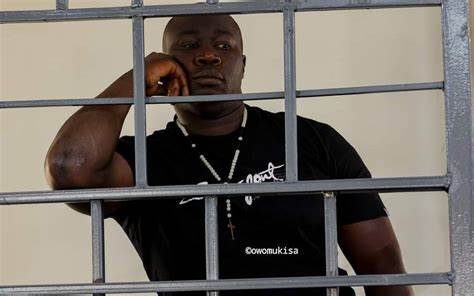By AGGREY BULUBA
Kampala, Uganda – The Ugandan government faces mounting criticism as the prosecution struggles to substantiate charges against Achileo Kivumbi, head of security for opposition leader Bobi Wine. Kivumbi, who returned to the Makindye General Court Martial on November 11, 2024, has become embroiled in a contentious case that has fueled accusations of government overreach and mistreatment of opposition figures.
A state prosecution witness, reportedly one of the “arresting officers,” sought to have Kivumbi’s bail revoked, alleging that he breached conditions by revealing details of torture endured during his detention. However, the court dismissed the witness’s claims, raising further questions about the state’s handling of Kivumbi’s arrest and treatment. Critics argue that the government uses the legal system to suppress dissent, with weak and contradictory testimony casting doubt on the prosecution’s intentions.
The witness’s account contained significant discrepancies. He claimed that Kivumbi was arrested on August 2 at 11:00 p.m., yet defense arguments assert that Kivumbi was abducted from his home in Nansana on August 1 at 8:00 p.m., a timeline the prosecution has yet to reconcile. The witness also alleged that Kivumbi was detained at SIU Kireka but could not provide supporting documentation. Kivumbi’s defense instead contends that he was held at the Directorate of Intelligence Services (DIS) headquarters in Mbuya, where he allegedly suffered abuse.
Critics have highlighted Kivumbi’s case as emblematic of a broader government crackdown on opposition figures. Opposition leaders accuse the ruling National Resistance Movement (NRM) of using the court system as a tool against dissent, employing tactics that seem driven by political motives rather than justice. The international community has also noticed, with human rights groups urging the Ugandan government to respect due process and ensure fair treatment.
Legal experts and activists argue that the state’s handling of Kivumbi’s case reflects a larger pattern of harassment against opposition leaders. The defense team, led by prominent human rights lawyers George Musisi and Benjamin Katana, has pledged to expose what they call an “abuse of judicial processes” in the face of a prosecution effort that appears increasingly desperate.
The court has adjourned the case to December 18, 2024, allowing the prosecution more time to strengthen a case that, under scrutiny, some believe is already beginning to unravel.







Discussion about this post